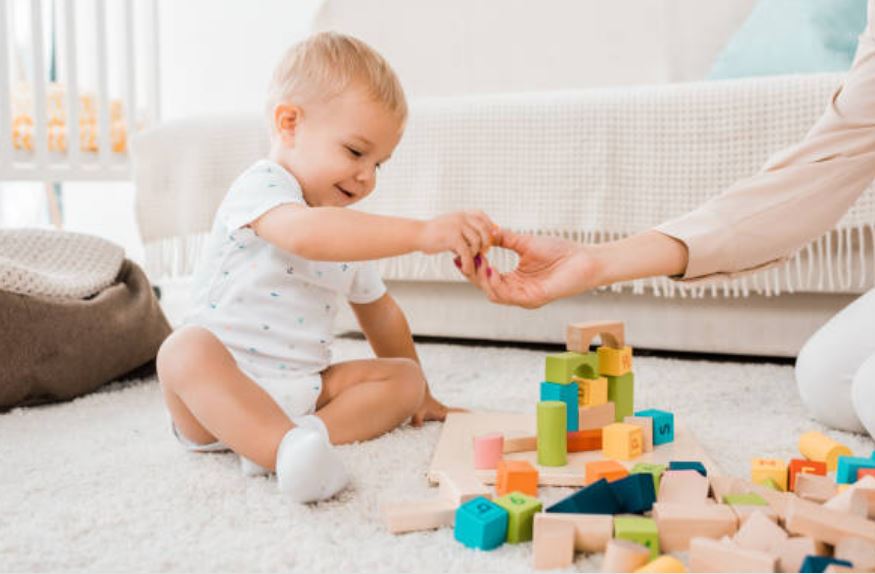Montessori education emphasizes hands-on learning, self-directed activity, and collaborative play. One of the key components of this approach is the use of specially designed toys and materials that cater to different developmental stages. In this comprehensive guide, we will explore the best Montessori toys for infants, toddlers, and preschoolers, ensuring that each age group receives the most appropriate and beneficial learning experiences. For more Montessori-inspired products, visit Montessori Australia.

Montessori Toys for Infants (0-12 Months)
During the first year of life, infants are rapidly developing their sensory and motor skills. Montessori toys for this age group should stimulate their senses and encourage exploration.
1. Mobiles
Montessori mobiles are designed to engage an infant’s visual senses. These mobiles often feature high-contrast colors, geometric shapes, and gentle movements that help develop focus and tracking skills. Some popular options include the Munari, Gobbi, and Octahedron mobiles.
2. Soft Cloth Books
Soft cloth books with different textures, colors, and patterns are perfect for sensory exploration. They encourage tactile development and can be introduced during tummy time or while sitting with a caregiver.
3. Wooden Grasping Toys
Simple wooden toys that are easy to grasp help infants develop their fine motor skills. Look for toys with different textures and shapes to provide varied sensory experiences. Rattles, rings, and interlocking discs are excellent choices.
4. Teething Toys
Teething toys made from natural materials like wood or silicone provide relief for teething discomfort while promoting oral exploration. Choose toys that are easy to hold and safe to chew on.
5. Mirrors
Unbreakable mirrors allow infants to observe their own reflections, which helps with self-recognition and social development. Place a mirror at their eye level during tummy time to encourage movement and interaction.

Montessori Toys for Toddlers (1-3 Years)
Toddlers are eager to explore their environment and develop their independence. Montessori toys for this age group should focus on practical life skills, sensory experiences, and problem-solving.
1. Stacking and Nesting Toys
Stacking and nesting toys help toddlers develop their hand-eye coordination, fine motor skills, and spatial awareness. Look for sets that vary in size, color, and shape to provide a range of learning opportunities.
2. Shape Sorters
Shape sorters are excellent for teaching toddlers about shapes, colors, and problem-solving. Choose sorters with large, easy-to-grasp pieces and sturdy construction.
3. Practical Life Toys
Practical life toys mimic real-life activities and help toddlers develop their independence. Items like child-sized brooms, kitchen sets, and gardening tools allow them to practice everyday tasks in a safe and engaging way.
4. Sensory Bins
Sensory bins filled with rice, beans, sand, or water provide endless opportunities for tactile exploration. Add scoops, funnels, and small toys to enhance the experience and encourage imaginative play.
5. Puzzles
Simple wooden puzzles with large pieces help toddlers develop their problem-solving skills, hand-eye coordination, and spatial awareness. Start with puzzles featuring basic shapes and gradually introduce more complex designs.

Montessori Toys for Preschoolers (3-6 Years)
Preschoolers are developing their cognitive, social, and emotional skills. Montessori toys for this age group should foster creativity, critical thinking, and collaborative play.
1. Building Blocks
Building blocks encourage creativity, spatial awareness, and fine motor skills. Look for sets that include various shapes and sizes to allow for open-ended play and construction.
2. Art Supplies
Art supplies like colored pencils, watercolor paints, and modeling clay provide endless opportunities for creative expression. Encourage preschoolers to experiment with different mediums and techniques.
3. Science Kits
Science kits that explore concepts like magnetism, botany, and simple machines introduce preschoolers to the wonders of the natural world. Choose kits that are hands-on and age-appropriate.
4. Musical Instruments
Simple musical instruments like xylophones, drums, and maracas help preschoolers develop their sense of rhythm and coordination. Playing music also enhances their auditory discrimination and listening skills.
5. Role-Playing Toys
Role-playing toys like play kitchens, tool sets, and doctor kits allow preschoolers to engage in imaginative play and develop their social skills. These toys encourage cooperative play and help children understand different roles and responsibilities.

Choosing Montessori Toys: Key Considerations
When selecting Montessori toys, it’s essential to consider a few key factors to ensure the toys align with Montessori principles and support your child’s development.
1. Natural Materials
Montessori toys are typically made from natural materials like wood, metal, and fabric. These materials are durable, safe, and provide a tactile experience that plastic toys often lack.
2. Simplicity
Montessori toys are designed to be simple and purposeful, avoiding unnecessary distractions. This simplicity helps children focus on the task at hand and develop their concentration.
3. Developmental Appropriateness
Choose toys that match your child’s developmental stage and abilities. Toys that are too easy or too challenging can lead to frustration or boredom. Look for toys that provide just the right level of challenge to keep your child engaged and motivated.
4. Open-Ended Play
Toys that allow for open-ended play encourage creativity and imagination. Avoid toys with a single predetermined use and instead opt for items that can be used in various ways.
5. Realistic Representation
Montessori toys often reflect real-life objects and activities, helping children understand and engage with the world around them. Choose toys that represent everyday items and experiences accurately.
Selecting the right Montessori toys for your child can significantly enhance their developmental journey. From infancy through preschool, Montessori toys provide opportunities for hands-on learning, sensory exploration, and skill development. By choosing age-appropriate toys made from natural materials, focusing on simplicity and developmental appropriateness, and encouraging open-ended play, you can create a rich and supportive learning environment for your child.
For a wide range of Montessori-inspired toys and educational materials, visit Montessori Australia. Our curated selection ensures that you find the perfect toys to support your child’s growth and development at every stage.

